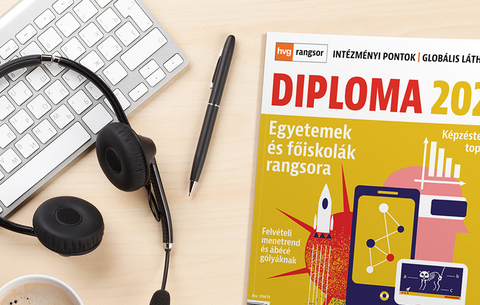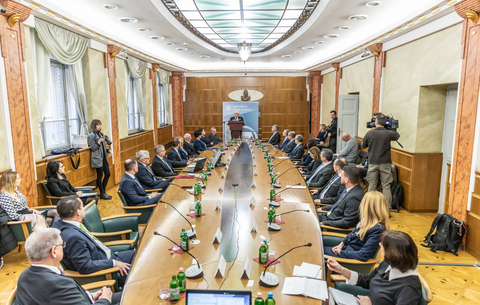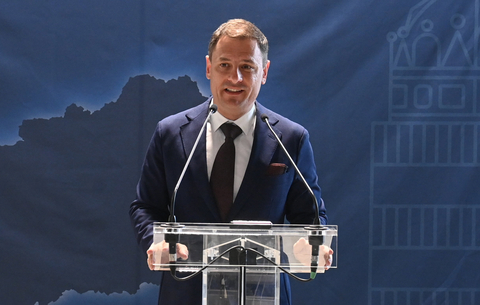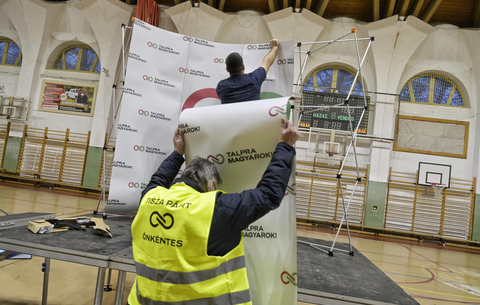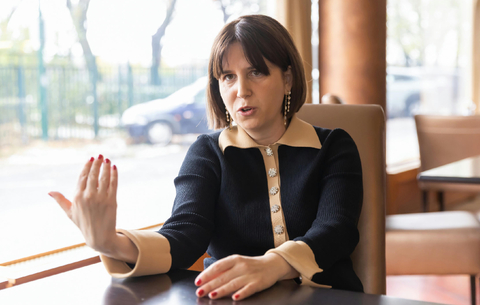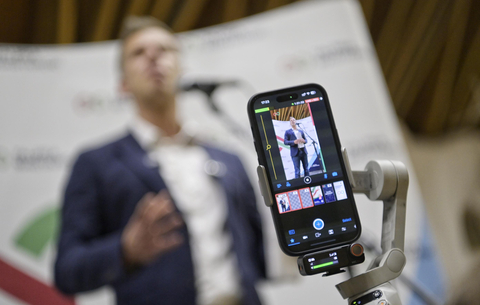Together at the top
"We were never a political family, but we watched the television news every evening at 7.30 , and then we discussed what we'd seen. That's how I grew up," says the 28-year-old new government spokeswoman.
Her father worked for MAV's locomotive repair works, while her mother had "minor economic roles," but both worked for their daughter's future, sending her to the Austrian high school in Budapest, although she graduated from a Hungarian school before studying political science at the Law Faculty of ELTE University in Budapest. She was an enthusiastic student. "The subject was new back then, and I made it my first choice. The School of Public Administration and Foreign Trade was only an emergency standby." Having enrolled in 1999, she was writing political analyses for Vision Consulting by her third year, but the success didn't go to her head. She barely scraped through her finals in 2004, since she was already studying international communication at the Budapest College of Economics, while studying for a doctorate at Corvinus University. She was even doing a bit of communications consulting for the Finance Ministry. She was a fearless critic of the government's work, so enraging the prime minister that he appointed her government spokesperson.
"I like Japan - one of my friends married a Japanese man. I visited her, and since then I've been an enthusiast for that very different world," she confesses. Caving is her latest passion. "I get dressed, put on a hard hat, holding a torch in my hand, and, deep in that eternal peace and silence I relax fully." There's some space for self-criticism. "I'm not a professional, so I only set out in groups of 10." On the surface, however, she prefers to drive her official Ford Mondeo to work.
A few months ago it seemed you were set against taking the job of government spokesperson. Why did you change your mind?
I did indeed say that it was impossible for someone in her twenties to have an overview of everything from health policy and education to pension reform. But I changed my mind when they suggested that there should be two of us, so I wouldn't be alone.
You can't say it, but let me suggest that they needed you so badly, that they simply doubled up, creating a new post. Certainly, you seemed so overwhelmed at the beginning that you could only say the most obvious commonplaces.
Don't be so harsh! I thought my first steps were very self-confident. It's true, however, that you have to avoid technical jargon, since I'm a kind of interpreter. I have to explain what the government is doing to ordinary people. If they don't understand what the government is doing, they can't be expected to lend it their support.
But how do you make your comments memorable and unique to you?
Women have an advantage here. Look at the popularity lists - women tend to come higher up. This is an advantage that you have to make use of.
It is well known that after your failure in the first casting sessions, they looked for alternatives. It must have been satisfying that they chose you anyway. Have you ever regretted being chosen?
I'm still very happy that I got this opportunity. I accepted the offer because I thought it would be a real challenge, but not one that was beyond me.
There you are! Newsgatherers love these elegant phrases! Of course, you have to be very disciplined. To what extent can you speak in your own words? Do they tell you what phrases or words you can use in public?
There's no prepared text. They give guidelines. The point is to explain what the prime minister and the government are saying.
And if the press wants something else? Two of your colleagues from ELTE say they were familiar with this phraseology when you were still at nursery.
If I can appear competent, if I can deliver good results, then my replies will be taken seriously, and people will be more inclined to accept them. It takes time. But somebody in their twenties can be an effective communicator.
Very good, you've kept calm. But let's stop talking shop. At risk of enraging the feminists, let us ask about your appearance. Skirt or trousers? How do you feel most comfortable? What will we see you in?
I prefer trousers - trouser suits are good. I only wear skirts when it's hot, although they tell me to wear them more often.
Have you given in to them, or are you sticking to your guns?
Thankfully there are no strict rules. I get advice, but I choose whether to accept it. I've been told to cover my shoulder and that you shouldn't be seen in open sandals, but you can wear a skirt without tights, for example.
Surely because the coalition includes a liberal party...
Not at all. Protocol allows for this because Lady Diana wants dressed like this at a public event. Since then, it's been allowed. So we have her to thank that we don't have to suffer in tights.
Another reason to admire her. Of course, we wouldn't like to compare you to her, but you also live in a relationship that may suffer from your becoming a national figure so suddenly. Aren't you worried that your partner will confront you with a choice: me or your career?
We spend less time together, but we discussed everything beforehand, my schedule, my workflow, and so we both knew what we were going into. My assumption was that if it were the other way round I certainly wouldn't issue the same unpleasant ultimatum. You have to accept and tolerate your partner's profession. We can't satisfy every news site and newspaper, and I'm sure we'll be attacked, sometimes without any justification.
Oh, a note of steel entered your voice just then. You used to score the government's communication work, taking quite a strict line. You must look back to the grades you gave back then. Have you given yourself a grade?
Let's say that I can see improvements. But I'll wait before grading myself. For the time being, I just want to be allowed to prove myself.
ANDRÁS LINDNER - ZOLTÁN HORVÁTH
